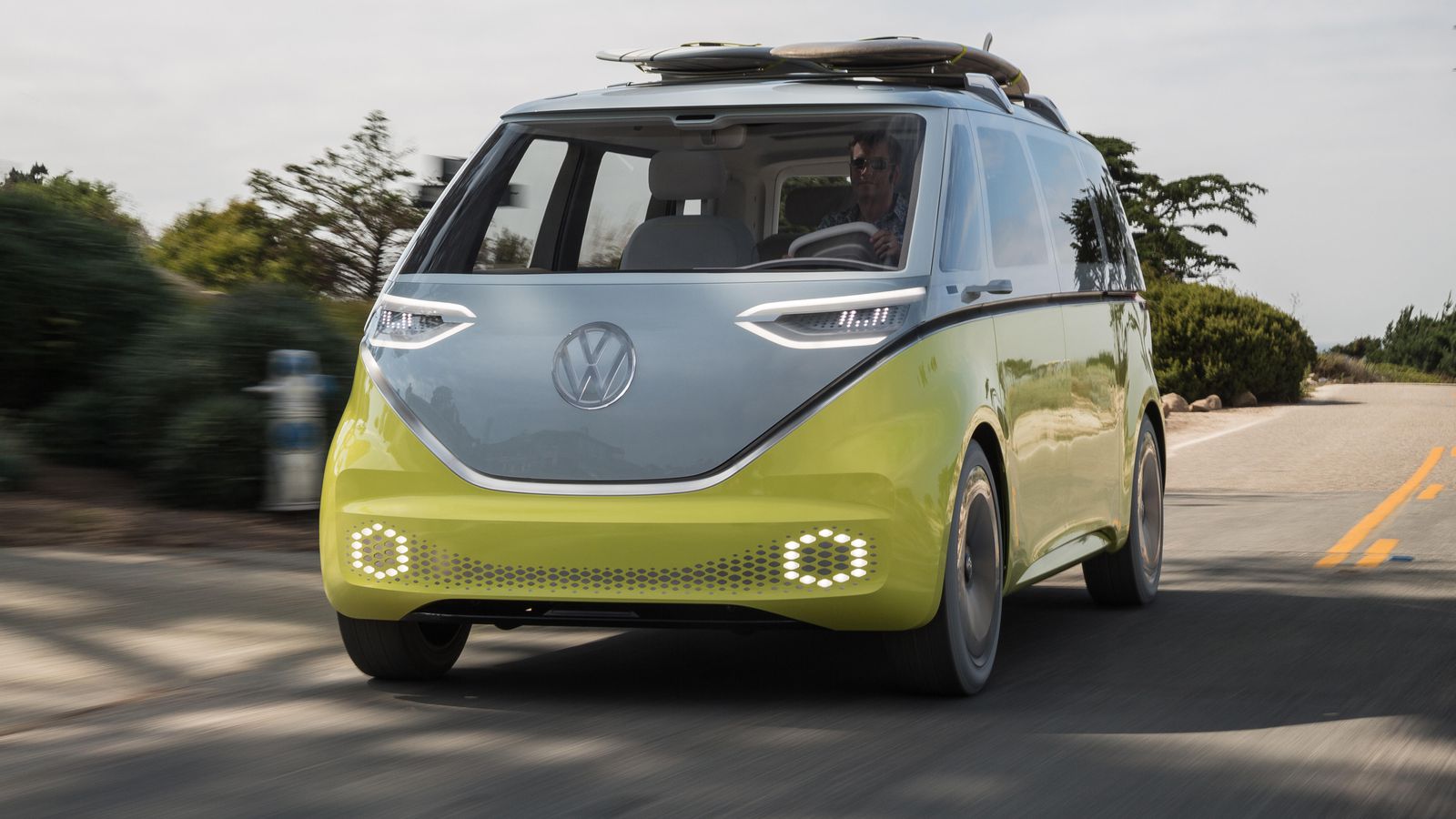
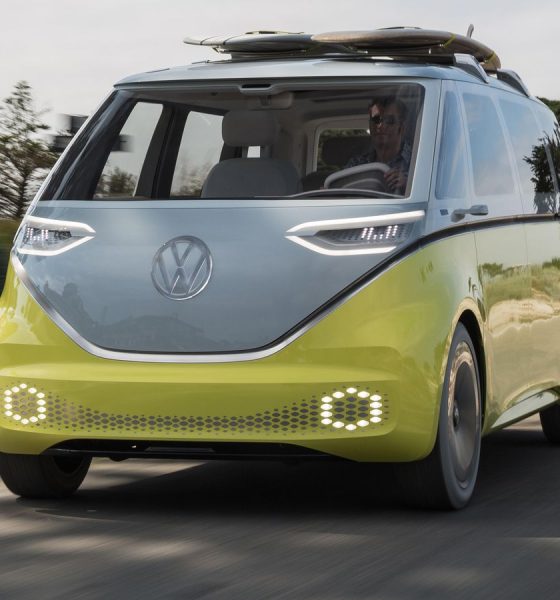
News
Ford and VW are considering an alliance to push EVs in Tesla-dominated market
As the auto market continues to get saturated by electric vehicles like the Tesla Model 3, legacy carmakers Volkswagen and Ford are considering an alliance to help bring compelling EVs to the market. If the partnership pushes through, Ford would be able to use Volkswagen’s MEB architecture for its own electric cars.
The possible partnership between the two auto titans was initially announced back in June, when the companies noted that they were considering a development and production alliance. During that time, Ford and VW noted that the partnership would involve the development of light commercial vehicles. In a statement to Automotive News on Tuesday, though, Volkswagen CFO Frank Witter stated that Volkswagen would be open to sharing its MEB electric vehicle architecture with the American automaker as well.
“Whether we might provide access to other brands outside of the VW Group is theoretically possible, but there is no decision,” he said.
Witter also asserted that Volkswagen is focused on making the necessary preparations for the rollout of its MEB-based vehicles, the first of which is planned to go into production late next year. The MEB-based cars would be manufactured in Volkswagen’s Zwickau, Germany plant, which is currently being converted into an electric car factory.
Volkswagen has grand plans for its electric car initiatives, with the company expecting to build 10 million vehicles using its MEB architecture. The German carmaker plans to start its EV program with the release of a car internally called the I.D. Neo, followed by the I.D. Crozz crossover for the US and China. Over the company’s four brands — VW, Skoda, Audi, and Seat — Volkswagen aims to release a total of 27 car models by the end of 2022.
In a recent interview, Volkswagen CEO Herbert Diess also expressed his confidence in the company’s electric car initiatives. Laying the gauntlet on first movers like Tesla, the VW CEO even declared that by 2020, Volkswagen would offering cars that rival Tesla’s vehicles spec-for-spec for half the price.
Ford teases a future iteration of the iconic Mustang. [Credit: Ford Motor Company/YouTube]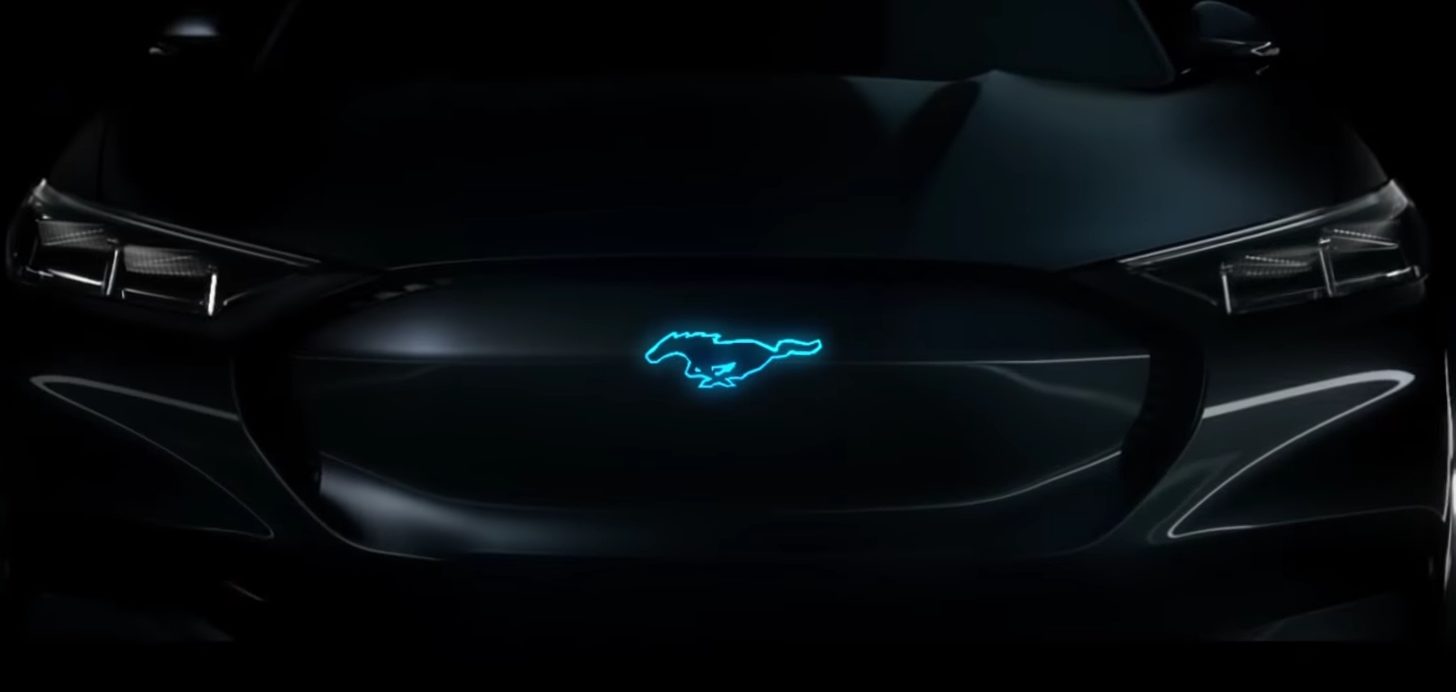
“We are coming on very strong now. We have invested 30 billion euros ($33.9 billion) in electromobility, we have already rededicated a plant in Zwickau, and we are building an electric vehicle plant in Shanghai. Truly highly attractive vehicles will begin arriving from Volkswagen as early as 2019. We will come in 2020 with vehicles that can do anything like Tesla and are cheaper by half,” Diess said.
Ultimately, a deal between Volkswagen and Ford would benefit the American carmaker. Ford, after all, has lagged mainly in the electric car industry. While the company still manufactures America’s best-selling vehicle — the Ford F-150 pickup truck — it has not produced compelling electric cars to date. Ford’s rivals in the legacy auto industry such as GM and Nissan, on the other hand, have developed capable EVs of their own, in the form of the Bolt EV and the Leaf. While the Bolt EV has mostly been eclipsed by the Model 3 amidst Tesla’s production ramp for the electric sedan, the Leaf continues to sell well in the US and abroad, and is one of the best entry-level EVs in the market.
That said, Ford appears to be taking a more assertive stance recently, as shown in an ad campaign taunting Silicon Valley-based carmakers like Tesla. In a TV spot featuring Hollywood A-lister Bryan Cranston, for example, Ford boldly declared that ultimately, “Talk doesn’t get things done. Building does.” The ad also teased several upcoming projects, including what appears to be a hybrid or electric-powered Mustang.

News
BREAKING: Tesla launches public Robotaxi rides in Austin with no Safety Monitor
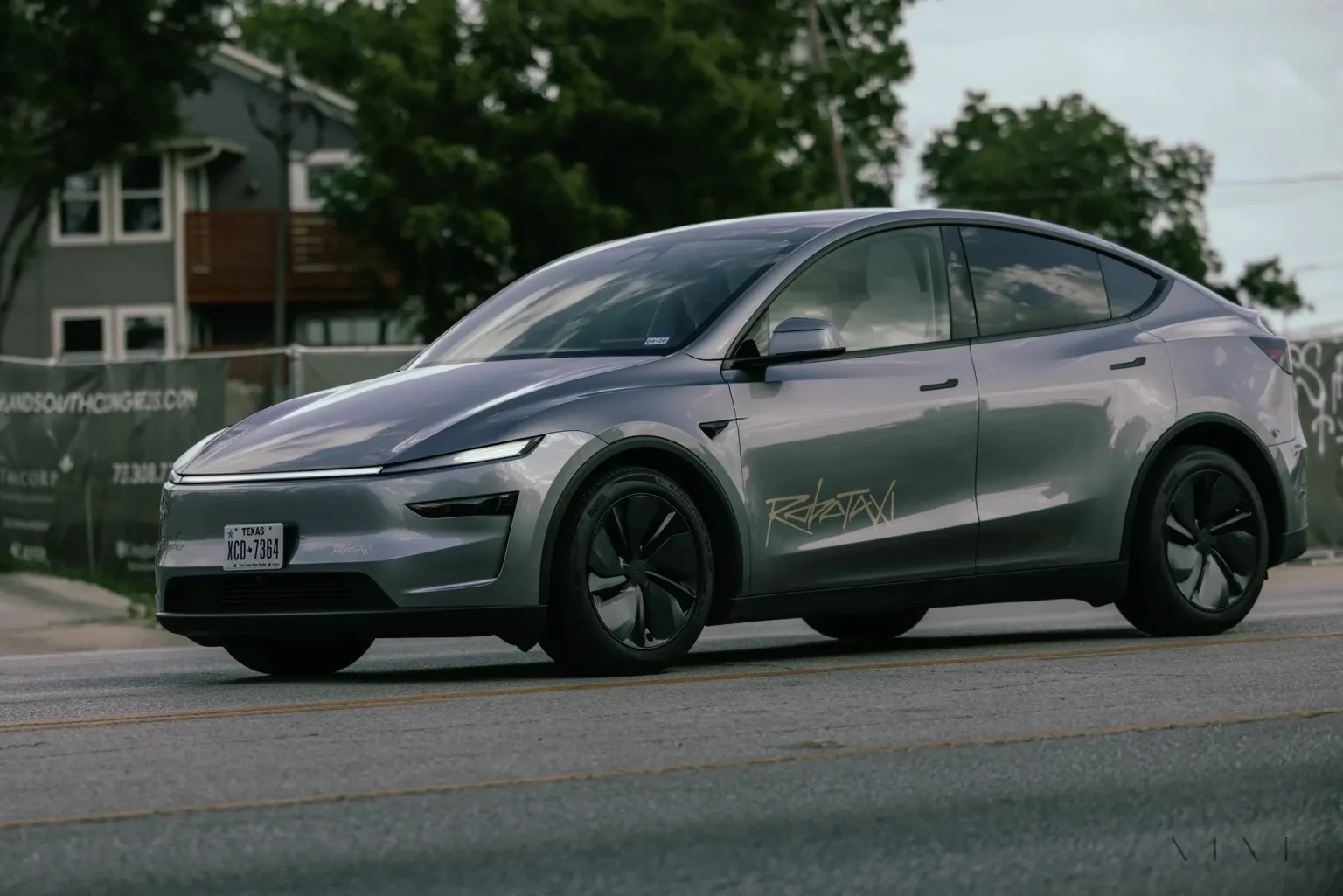
Tesla has officially launched public Robotaxi rides in Austin, Texas, without a Safety Monitor in the vehicle, marking the first time the company has removed anyone from the vehicle other than the rider.
The Safety Monitor has been present in Tesla Robotaxis in Austin since its launch last June, maintaining safety for passengers and other vehicles, and was placed in the passenger’s seat.
Tesla planned to remove the Safety Monitor at the end of 2025, but it was not quite ready to do so. Now, in January, riders are officially reporting that they are able to hail a ride from a Model Y Robotaxi without anyone in the vehicle:
I am in a robotaxi without safety monitor pic.twitter.com/fzHu385oIb
— TSLA99T (@Tsla99T) January 22, 2026
Tesla started testing this internally late last year and had several employees show that they were riding in the vehicle without anyone else there to intervene in case of an emergency.
Tesla has now expanded that program to the public. It is not active in the entire fleet, but there are a “few unsupervised vehicles mixed in with the broader robotaxi fleet with safety monitors,” Ashok Elluswamy said:
Robotaxi rides without any safety monitors are now publicly available in Austin.
Starting with a few unsupervised vehicles mixed in with the broader robotaxi fleet with safety monitors, and the ratio will increase over time. https://t.co/ShMpZjefwB
— Ashok Elluswamy (@aelluswamy) January 22, 2026
Tesla Robotaxi goes driverless as Musk confirms Safety Monitor removal testing
The Robotaxi program also operates in the California Bay Area, where the fleet is much larger, but Safety Monitors are placed in the driver’s seat and utilize Full Self-Driving, so it is essentially the same as an Uber driver using a Tesla with FSD.
In Austin, the removal of Safety Monitors marks a substantial achievement for Tesla moving forward. Now that it has enough confidence to remove Safety Monitors from Robotaxis altogether, there are nearly unlimited options for the company in terms of expansion.
While it is hoping to launch the ride-hailing service in more cities across the U.S. this year, this is a much larger development than expansion, at least for now, as it is the first time it is performing driverless rides in Robotaxi anywhere in the world for the public to enjoy.
Investor's Corner
Tesla Earnings Call: Top 5 questions investors are asking
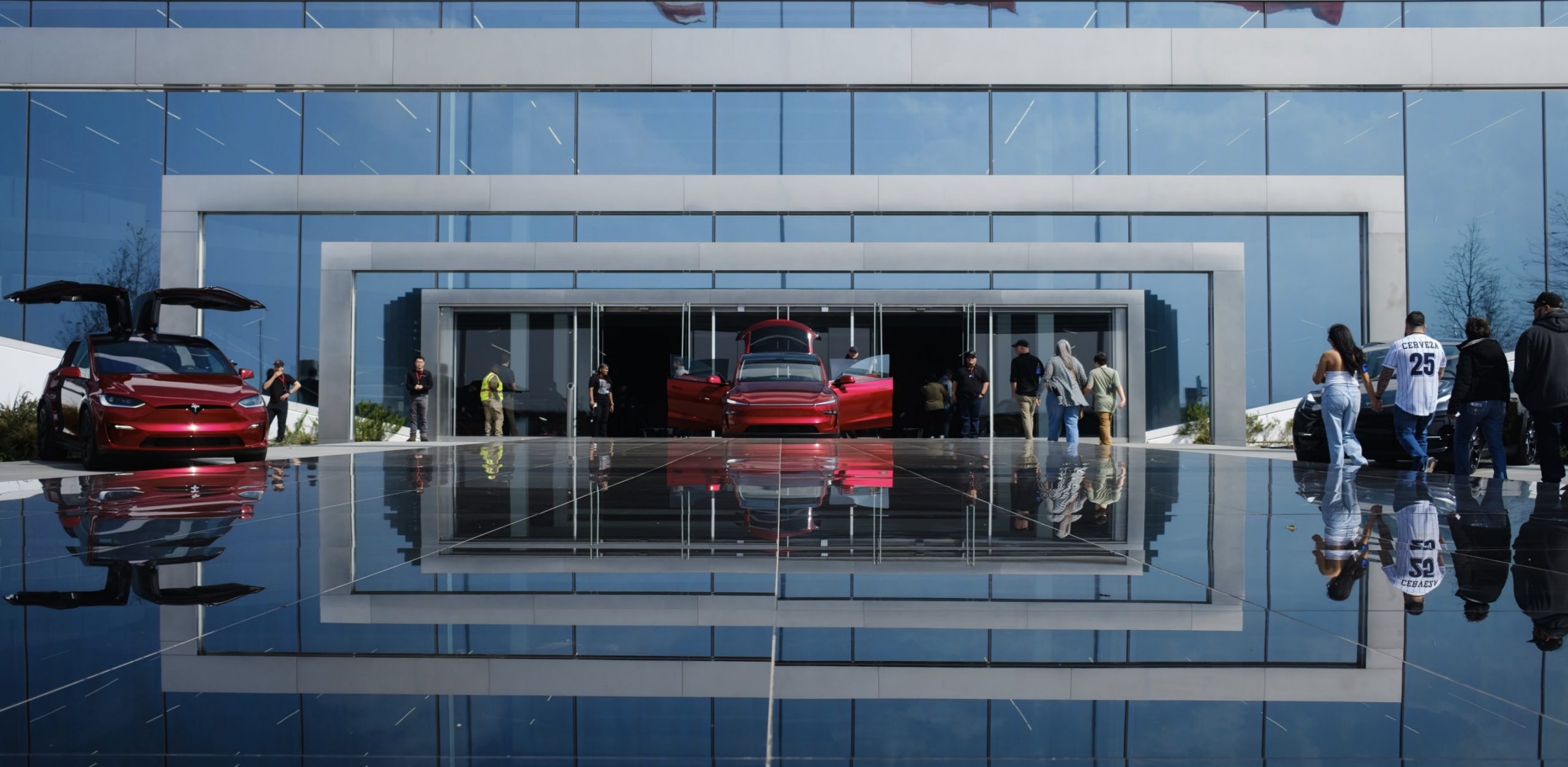
Tesla has scheduled its Earnings Call for Q4 and Full Year 2025 for next Wednesday, January 28, at 5:30 p.m. EST, and investors are already preparing to get some answers from executives regarding a wide variety of topics.
The company accepts several questions from retail investors through the platform Say, which then allows shareholders to vote on the best questions.
Tesla does not answer anything regarding future product releases, but they are willing to shed light on current timelines, progress of certain projects, and other plans.
There are five questions that range over a variety of topics, including SpaceX, Full Self-Driving, Robotaxi, and Optimus, which are currently in the lead to be asked and potentially answered by Elon Musk and other Tesla executives:
- You once said: Loyalty deserves loyalty. Will long-term Tesla shareholders still be prioritized if SpaceX does an IPO?
- Our Take – With a lot of speculation regarding an incoming SpaceX IPO, Tesla investors, especially long-term ones, should be able to benefit from an early opportunity to purchase shares. This has been discussed endlessly over the past year, and we must be getting close to it.
- When is FSD going to be 100% unsupervised?
- Our Take – Musk said today that this is essentially a solved problem, and it could be available in the U.S. by the end of this year.
- What is the current bottleneck to increase Robotaxi deployment & personal use unsupervised FSD? The safety/performance of the most recent models or people to monitor robots, robotaxis, in-car, or remotely? Or something else?
- Our Take – The bottleneck seems to be based on data, which Musk said Tesla needs 10 billion miles of data to achieve unsupervised FSD. Once that happens, regulatory issues will be what hold things up from moving forward.
- Regarding Optimus, could you share the current number of units deployed in Tesla factories and actively performing production tasks? What specific roles or operations are they handling, and how has their integration impacted factory efficiency or output?
- Our Take – Optimus is going to have a larger role in factories moving forward, and later this year, they will have larger responsibilities.
- Can you please tie purchased FSD to our owner accounts vs. locked to the car? This will help us enjoy it in any Tesla we drive/buy and reward us for hanging in so long, some of us since 2017.
- Our Take – This is a good one and should get us some additional information on the FSD transfer plans and Subscription-only model that Tesla will adopt soon.
Tesla will have its Earnings Call on Wednesday, January 28.
Elon Musk
Elon Musk shares incredible detail about Tesla Cybercab efficiency
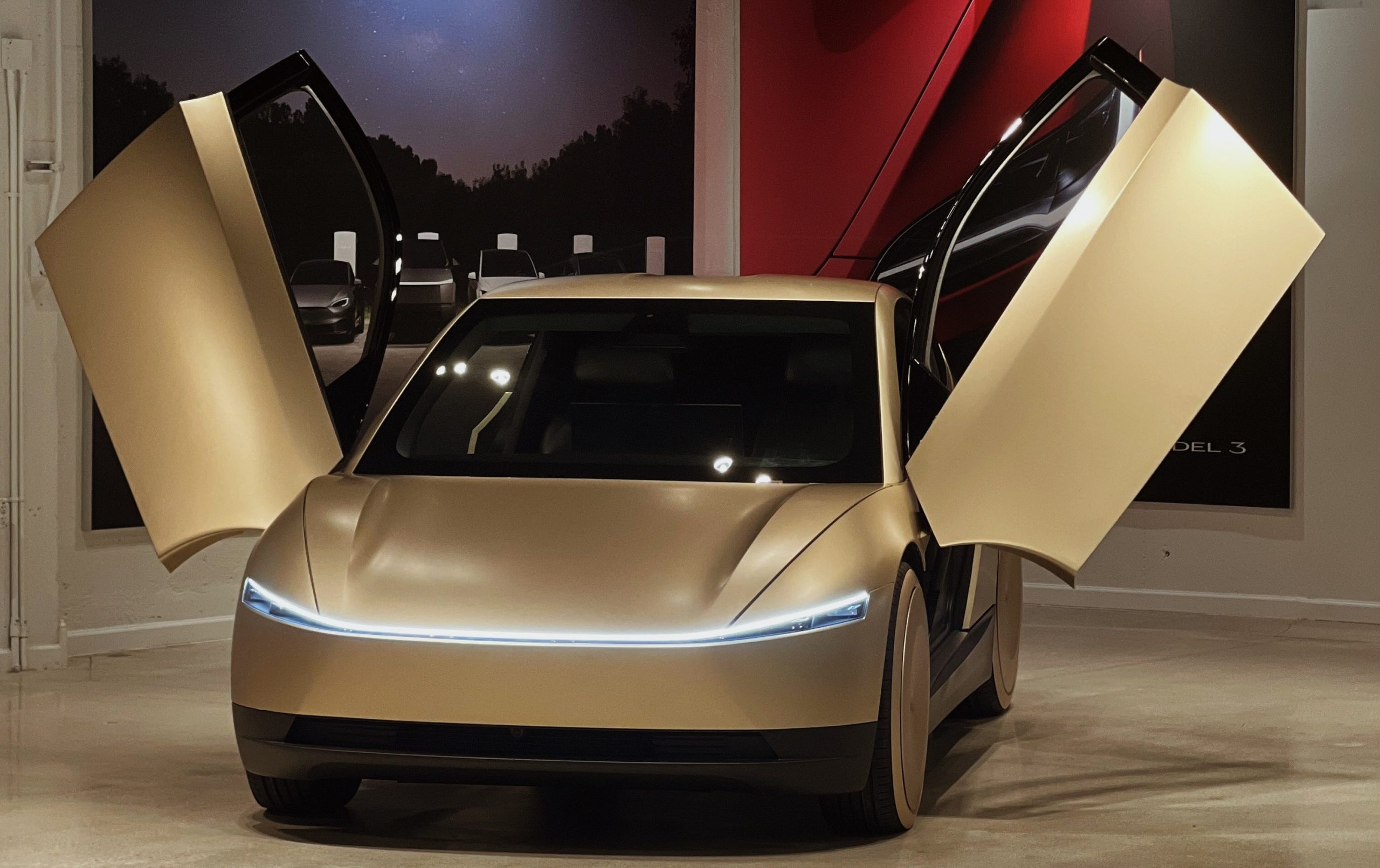
Elon Musk shared an incredible detail about Tesla Cybercab’s potential efficiency, as the company has hinted in the past that it could be one of the most affordable vehicles to operate from a per-mile basis.
ARK Invest released a report recently that shed some light on the potential incremental cost per mile of various Robotaxis that will be available on the market in the coming years.
The Cybercab, which is detailed for the year 2030, has an exceptionally low cost of operation, which is something Tesla revealed when it unveiled the vehicle a year and a half ago at the “We, Robot” event in Los Angeles.
Musk said on numerous occasions that Tesla plans to hit the $0.20 cents per mile mark with the Cybercab, describing a “clear path” to achieving that figure and emphasizing it is the “full considered” cost, which would include energy, maintenance, cleaning, depreciation, and insurance.
Probably true
— Elon Musk (@elonmusk) January 22, 2026
ARK’s report showed that the Cybercab would be roughly half the cost of the Waymo 6th Gen Robotaxi in 2030, as that would come in at around $0.40 per mile all in. Cybercab, at scale, would be at $0.20.
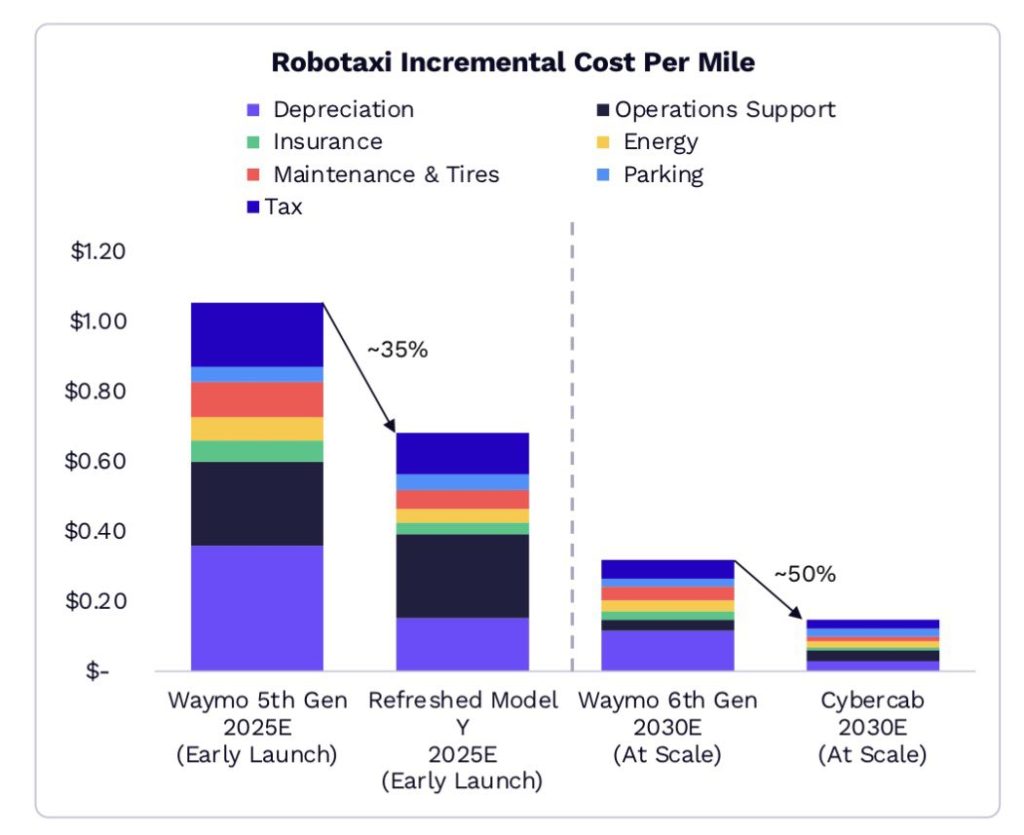
Credit: ARK Invest
This would be a dramatic decrease in the cost of operation for Tesla, and the savings would then be passed on to customers who choose to utilize the ride-sharing service for their own transportation needs.
The U.S. average cost of new vehicle ownership is about $0.77 per mile, according to AAA. Meanwhile, Uber and Lyft rideshares often cost between $1 and $4 per mile, while Waymo can cost between $0.60 and $1 or more per mile, according to some estimates.
Tesla’s engineering has been the true driver of these cost efficiencies, and its focus on creating a vehicle that is as cost-effective to operate as possible is truly going to pay off as the vehicle begins to scale. Tesla wants to get the Cybercab to about 5.5-6 miles per kWh, which has been discussed with prototypes.
Additionally, fewer parts due to the umboxed manufacturing process, a lower initial cost, and eliminating the need to pay humans for their labor would also contribute to a cheaper operational cost overall. While aspirational, all of the ingredients for this to be a real goal are there.
It may take some time as Tesla needs to hammer the manufacturing processes, and Musk has said there will be growing pains early. This week, he said regarding the early production efforts:
“…initial production is always very slow and follows an S-curve. The speed of production ramp is inversely proportionate to how many new parts and steps there are. For Cybercab and Optimus, almost everything is new, so the early production rate will be agonizingly slow, but eventually end up being insanely fast.”








